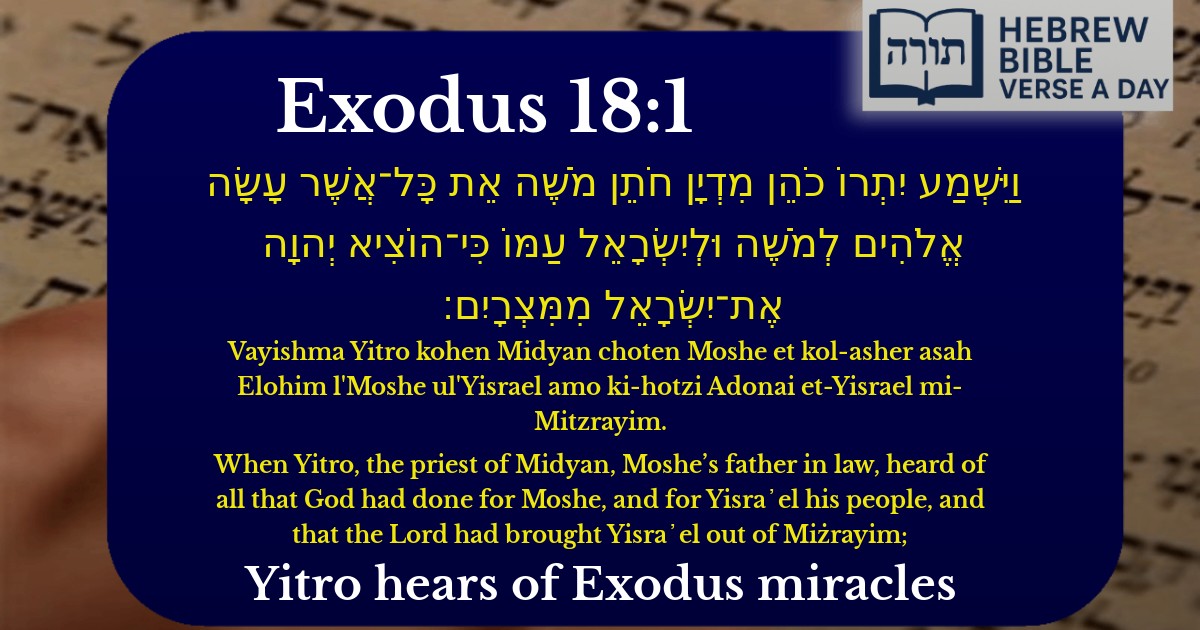Join Our Newsletter To Be Informed When New Videos Are Posted
Join the thousands of fellow Studends who rely on our videos to learn how to read the bible in Hebrew for free!
Hebrew Text
וַיִּשְׁמַע יִתְרוֹ כֹהֵן מִדְיָן חֹתֵן מֹשֶׁה אֵת כָּל־אֲשֶׁר עָשָׂה אֱלֹהִים לְמֹשֶׁה וּלְיִשְׂרָאֵל עַמּוֹ כִּי־הוֹצִיא יְהוָה אֶת־יִשְׂרָאֵל מִמִּצְרָיִם׃
English Translation
When Yitro, the priest of Midyan, Moshe’s father in law, heard of all that God had done for Moshe, and for Yisra᾽el his people, and that the Lord had brought Yisra᾽el out of Miżrayim;
Transliteration
Vayishma Yitro kohen Midyan choten Moshe et kol-asher asah Elohim l'Moshe ul'Yisrael amo ki-hotzi Adonai et-Yisrael mi-Mitzrayim.
Hebrew Leining Text
וַיִּשְׁמַ֞ע יִתְר֨וֹ כֹהֵ֤ן מִדְיָן֙ חֹתֵ֣ן מֹשֶׁ֔ה אֵת֩ כׇּל־אֲשֶׁ֨ר עָשָׂ֤ה אֱלֹהִים֙ לְמֹשֶׁ֔ה וּלְיִשְׂרָאֵ֖ל עַמּ֑וֹ כִּֽי־הוֹצִ֧יא יְהֹוָ֛ה אֶת־יִשְׂרָאֵ֖ל מִמִּצְרָֽיִם׃
וַיִּשְׁמַ֞ע יִתְר֨וֹ כֹהֵ֤ן מִדְיָן֙ חֹתֵ֣ן מֹשֶׁ֔ה אֵת֩ כׇּל־אֲשֶׁ֨ר עָשָׂ֤ה אֱלֹהִים֙ לְמֹשֶׁ֔ה וּלְיִשְׂרָאֵ֖ל עַמּ֑וֹ כִּֽי־הוֹצִ֧יא יְהֹוָ֛ה אֶת־יִשְׂרָאֵ֖ל מִמִּצְרָֽיִם׃
🎵 Listen to leining
Parasha Commentary
📚 Talmud Citations
This verse is quoted in the Talmud.
📖 Zevachim 116a
The verse is cited in the context of discussing the timing of Yitro's arrival and his reaction to the miracles performed for Israel.
📖 Sanhedrin 94a
Mentioned in a discussion about the recognition of God's power by non-Jews, specifically referencing Yitro's acknowledgment of God's deeds.


The Significance of Yitro's Hearing
The verse (Shemot 18:1) describes how Yitro, Moshe's father-in-law, heard about the miracles Hashem performed for Bnei Yisrael. Rashi explains that Yitro heard specifically about Kriat Yam Suf (the splitting of the Red Sea) and the war with Amalek, as these were the most recent and dramatic events. The Midrash Tanchuma (Yitro 1) elaborates that the entire world heard about these miracles, but only Yitro was moved to action.
Yitro's Title as "Kohen Midyan"
The Torah refers to Yitro as "Kohen Midyan" (Priest of Midyan). Ramban notes that this title indicates his high status as a spiritual leader among the nations. The Talmud (Zevachim 116a) states that Yitro had experimented with every form of idolatry before recognizing Hashem's supremacy, showing his sincere search for truth.
The Phrase "All That God Had Done"
The verse emphasizes that Yitro heard "all that God had done". The Mechilta (Yitro 1) explains this refers to both the Exodus and the giving of the Manna, showing Hashem's continuous care for Israel. Sforno adds that Yitro recognized these were not natural events but direct divine intervention.
Yitro's Relationship to Moshe
The Torah specifies Yitro as "Choten Moshe" (Moshe's father-in-law). The Kli Yakar notes this connection is mentioned to show that despite his familial tie, Yitro's decision to join Bnei Yisrael was based on spiritual recognition, not just family loyalty. The Or HaChaim highlights that Yitro's conversion was complete, as he later advises Moshe on judicial systems (Shemot 18:17-23).